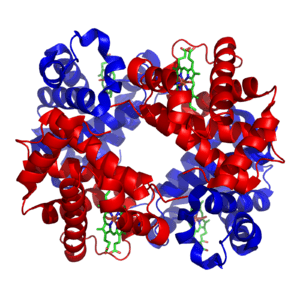Globular protein facts for kids

A globular protein is a common type of protein. Think of them as tiny, folded-up balls! They are one of three main types of proteins. The others are fibrous proteins (which are long and stringy) and membrane proteins (which live in cell walls).
Globular proteins get their special shape from a process called protein folding. This means long chains of smaller units, called polypeptides, fold up tightly into a compact, sphere-like shape. They can dissolve easily in water because their "water-loving" parts are on the outside. These proteins are super important for many reactions that happen inside living things.
Contents
What Do Globular Proteins Do?
Unlike some proteins that only provide structure, globular proteins have many different jobs. They are like the busy workers of your body!
Acting as Enzymes
Many globular proteins work as enzymes. Enzymes are special helpers that speed up chemical reactions in your body. They do this very precisely and under gentle conditions. For example, some enzymes called esterases help break down fats.
Sending Messages (Hormones)
Some globular proteins act as hormones. Hormones are like messengers that carry signals to control different processes in your body. A good example is insulin, which helps control your blood sugar levels.
Moving Things Around
Globular proteins can also be transporters. They help move other molecules, like nutrients or waste, across the outer layer of cells.
Storing Building Blocks
They can also act as storage for amino acids. Amino acids are the small building blocks that make up proteins.
Helping with Structure
While many globular proteins are busy doing chemical jobs, some also help with structure. For example, actin and tubulin are globular proteins that can link together to form long, stiff fibers. These fibers help cells keep their shape and move around.
Examples of Globular Proteins
Two well-known examples of globular proteins are myoglobin and hemoglobin. Hemoglobin is found in your blood and carries oxygen from your lungs to the rest of your body. Myoglobin stores oxygen in your muscles.
What Are Globulins?
Globulins are a group of globular proteins. The only globular proteins that are NOT globulins are called albumins. Globulins are generally larger than albumins. They don't dissolve well in pure water, but they do dissolve in slightly salty water.
Some globulins are very important because they act as antibodies. Antibodies are part of your immune system and help fight off germs and diseases. Other globulins help carry important substances like fats, iron, or copper through your blood.
See Also
 In Spanish: Proteína globular para niños
In Spanish: Proteína globular para niños

